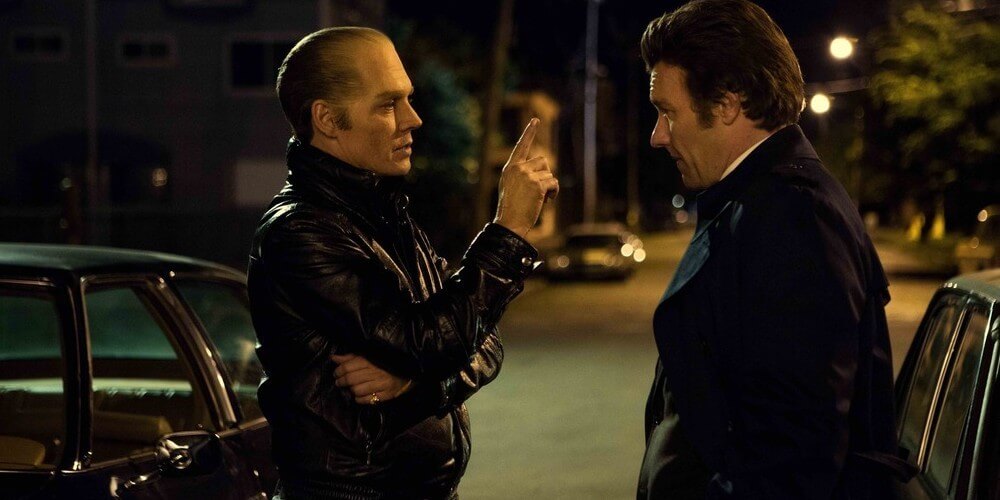BLACK MASS. Outstanding Johnny Depp in a role you can’t miss

Funny thing, loyalty. Sometimes years of close collaboration hand in hand aren’t enough to solidify it adequately, while a single act of support shown to someone in their moment of greatest weakness builds a bond for years. Blind dedication stronger than the demands of healthy reasoning or ordinary selfishness, with an echo of idolatrous admiration in the background, from which a little tough guy never managed to shake himself free, even after growing up, maturing, and becoming an FBI agent.
That, essentially, is what this movie is about. About the various faces of loyalty and how it can be twisted in perverse ways. The basis for “Black Mass” was the true story of underworld boss James “Whitey” Bulger, who led the Irish Winter Hill Gang, ruling over South Boston from the early ’70s to the late ’90s. Initially a big fish in a small pond, he eventually became a criminal icon, allegedly with the FBI’s backing, specifically his childhood neighbor, John Connolly, whom he supposedly served as a secret informant from 1975.
This one-sided partnership, mainly based on advantageous tips for Bulger and morsels of information for the FBI, ultimately ended in a spectacular disaster, not to mention scandal. Bulger successfully evaded justice for several years before finally being incarcerated, while Connolly was sentenced to a total of 50 years in prison. Mostly due to exhaustive testimonies from former associates who forgot all about loyalty when their own fates were on the line. And really, it’s hard to blame them.

But Connolly didn’t go down that road. He remained faithful like a Labrador until the very end, as if that snotty kid saved from childhood bullies by Bulger was still inside him, accepting candies from the generous neighbor. Perhaps it’s hard for us to understand just how strong the bonds can be between outcasts building a semblance of independence in a foreign world, knowing they’ll never fully take root and will always be outsiders. Such mutual commitment is a source of strength but also dependency. In Connolly’s case, taken to absurd extremes.
The film has the pleasant atmosphere of old-school gangster cinema, perhaps too directly referencing the genre’s classics, especially “Goodfellas”. It unfolds leisurely, lacking a bit of nerve, some additional accent that would elevate the film from good to great. However, it has one indisputable asset – Johnny Depp’s marvelous performance, the best he’s given in years.
Johnny has accustomed us to dynamic, expressive roles, almost on the verge of overacting. In “Black Mass”, he goes in a completely different direction. His Bulger is repulsive, dry, inhumanly controlled, so chillingly cold that shivers run down your spine; under that lizard-like gaze, one instinctively recoils. Dormant within him is an unrestrained cruelty and a penchant for killing, gradually escalating – from a man who rules based on a complex network of dependencies and camaraderie, he transforms into a despot ruling with fear and violence. He’s not a charismatic godfather; he’s a full-blooded criminal who ruthlessly – personally! – eliminates anyone who stands in his way.

Connolly failed to notice this slow evolution in time, and that was his greatest mistake. In Joel Edgerton’s excellent portrayal, he’s slippery, yet fundamentally naive and awkward, having a higher opinion of himself than he deserves, tainted by some strange, groundlessly romantic vision of brotherhood in blood because, after all, a friend of a friend will never betray, expose, or deceive you. Surprisingly underwhelming in this mix is Benedict Cumberbatch as Jimmy’s brother, Senator William Bulger. He seems somewhat uncomfortable in front of the camera, as if the role demanded as much effort from him as attempting a Boston accent.
In conclusion, it’s not a film that I would enthusiastically and unhesitatingly place at the forefront of this year’s releases, but it’s certainly worth watching – if only because missing out on Depp’s outstanding performance is simply not an option.

